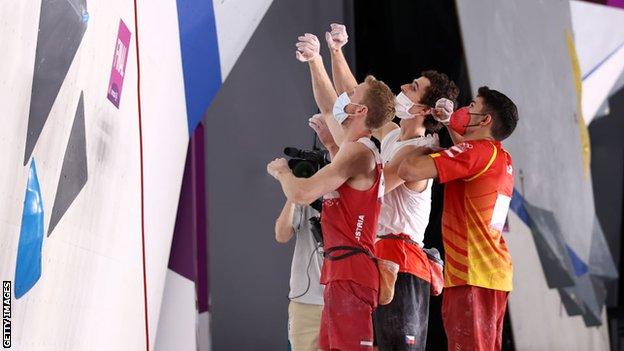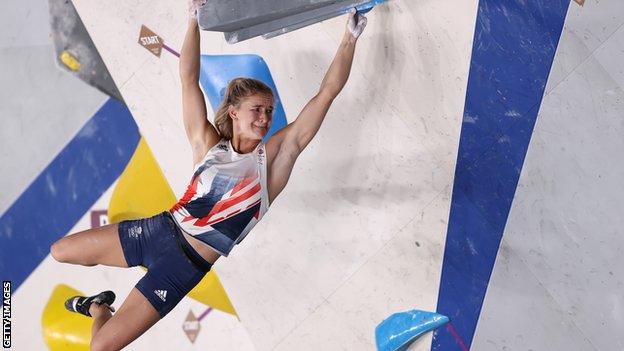Tokyo Olympics: Sport climbing - was it a success?
- Published
Can Radio 1's Jordan North face his fears with climber Shauna Coxsey?
Tokyo Olympic Games on the BBC |
|---|
Dates: 23 July-8 August Time in Tokyo: BST +8 |
Coverage: Watch live on BBC TV, BBC iPlayer, BBC Red Button and online; Listen on BBC Radio 5 Live, Sports Extra and Sounds; live text and video clips on BBC Sport website and app. |
Speed, bouldering and lead. The route to Olympic glory in sport climbing literally embodies the recently revised Olympic motto 'faster, higher, stronger, together'.
And it was the top trending, external Olympic sport on Google Search during its opening day of competition - suggesting it quickly grabbed people's attention.
The International Olympic Committee's (IOC) decision to introduce five new sports for Tokyo 2020 was billed as "the most comprehensive evolution of the Olympic programme" in modern history.
It was hoped a "focus on youth" with baseball, karate, skateboarding, sports climbing and surfing would capture the imagination of viewers around the world and adapt the Games for the 21st Century.
Skateboarding has thrived as young talents - including Britain's 13-year-old bronze medallist Sky Brown - dazzled with world-class skill and inspiring scenes of camaraderie.
But how has climbing, the last of the new sports to make its appearance in Tokyo, fared on its Olympic debut?
Allow X content?
This article contains content provided by X. We ask for your permission before anything is loaded, as they may be using cookies and other technologies. You may want to read X’s cookie policy, external and privacy policy, external before accepting. To view this content choose ‘accept and continue’.
'Like asking Usain Bolt to run a marathon and then do the hurdles'
The three disciplines of sport climbing are usually tackled separately in elite competition, however in Tokyo they were combined to determine an all-round champion.
In speed climbing, athletes race each other up a 15-metre wall, while bouldering pits the competitors against technical fixed routes that must be tackled within a set time.
If that was not enough, lead challenges the competitors to climb as high as they can in a single attempt on a 15m wall, within six minutes.
That format was described pre-Games by Team GB's sole representative Shauna Coxsey as "like asking Usain Bolt to run a marathon and then do the hurdles".
"The scoring is not the best it could be," American Colin Duffy said, following a seventh-placed finish in the men's final. "But in 2024 it will be a different format and hopefully it will work out a little better."
Spain's 18-year-old Alberto Gines Lopez wins the men's combined climbing gold.
'We all cheer for our friends - we see their struggle'
The scoring might be a headache for competitors, but its undoubtedly a spectacle for viewers - and with the average age of the sport's elite athletes being just 21 it certainly fits the IOC's youth objectives too.
On Thursday, 18-year-old Spaniard Alberto Gines Lopez made history by claiming the sport's first Olympic gold, becoming his country's youngest male Olympic champion in the process.
On Friday, Slovenia's Janja Garnbret, 22, claimed gold in the women's event.
'What a move!' - Janja Garnbret impresses during gold medal climb
The camaraderie evident at the skateboarding was mirrored at the Aomi Urban Sports Park - noticeably different from some of the fierce rivalries in more established Olympic sports.
"I think it all stems from outdoor climbing when you're climbing with your friends, you're working together to solve a problem and that carries over into competition," said American silver medallist Nathaniel Coleman.
"We're able to cheer for our friends, because we see them climbing, we see their struggle and we know how good it feels to do well, so we want that."

Competitors assessed the climbing walls together during the men's final
'A monumental time' - but what next for climbing?
Britain's Coxsey, who first encountered a bouldering wall when she was four-years-old, missed out on Friday's women's final after struggling with injury in qualification.
Despite her personal disappointment, the magnitude of contesting a climbing competition at an Olympics was not lost on Coxsey.
"It's a monumental time for our sport," the 28-year-old said. "It is going to be seen by so many more people. If someone sees climbing and goes and finds something that they absolutely love and have a passion for, that's huge to that individual.
"The professionalisation of the sport is huge. Before me, no-one had ever been a professional competition climber in the UK, so that in itself is a change in the sport."

Great Britain's Shauna Coxsey competing at Tokyo 2020
Along with surfing and skateboarding, climbing will retain its place at the next Olympics in Paris, a Games which will also witness a debut for breaking - a competitive form of breakdancing.
A total of 40 athletes - 20 men and 20 women - competed for two gold climbing medals in Tokyo, but the sport is set to expand in 2024 when 68 athletes will challenge for four golds, as the speed event becomes a separate discipline.
With climbing walls already present in more than 140 countries, over 35 million climbers around the world, and interest piqued following a first exposure to a truly global audience, these are exciting times in the sport.
"We trained so hard for this, and we were really thankful that we got to show everything that we worked so hard for," Austria's men's bronze medallist Jakob Schubert said.
"It means a lot to win a medal, and now a lot of people in Austria will watch climbing. I hope some more kids from all over the world will find this sport that gives us so much pleasure."
Allow X content?
This article contains content provided by X. We ask for your permission before anything is loaded, as they may be using cookies and other technologies. You may want to read X’s cookie policy, external and privacy policy, external before accepting. To view this content choose ‘accept and continue’.

The music that makes The Hundred: Check out the best new music from your teams region
Could a DNA test find you the perfect diet? How people are using the findings for nutrition advice
